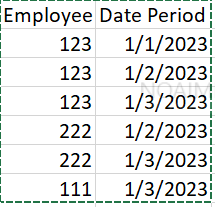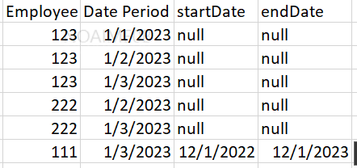Join us at FabCon Vienna from September 15-18, 2025
The ultimate Fabric, Power BI, SQL, and AI community-led learning event. Save €200 with code FABCOMM.
Get registered- Power BI forums
- Get Help with Power BI
- Desktop
- Service
- Report Server
- Power Query
- Mobile Apps
- Developer
- DAX Commands and Tips
- Custom Visuals Development Discussion
- Health and Life Sciences
- Power BI Spanish forums
- Translated Spanish Desktop
- Training and Consulting
- Instructor Led Training
- Dashboard in a Day for Women, by Women
- Galleries
- Data Stories Gallery
- Themes Gallery
- Contests Gallery
- Quick Measures Gallery
- Notebook Gallery
- Translytical Task Flow Gallery
- TMDL Gallery
- R Script Showcase
- Webinars and Video Gallery
- Ideas
- Custom Visuals Ideas (read-only)
- Issues
- Issues
- Events
- Upcoming Events
Enhance your career with this limited time 50% discount on Fabric and Power BI exams. Ends September 15. Request your voucher.
- Power BI forums
- Forums
- Get Help with Power BI
- Power Query
- Re: Merge tables where Date is between Start and E...
- Subscribe to RSS Feed
- Mark Topic as New
- Mark Topic as Read
- Float this Topic for Current User
- Bookmark
- Subscribe
- Printer Friendly Page
- Mark as New
- Bookmark
- Subscribe
- Mute
- Subscribe to RSS Feed
- Permalink
- Report Inappropriate Content
Merge tables where Date is between Start and End dates
I have a Master Table that include list of employees and I want to see who went on an assignment during the Date Period. I want to emphasize that not all employees went on assignment, which mean that not all employees are included in the Assignment Table and I don't want to filter them from the Master Sheet. Below is an example:
Master Table:
Assignment Table:
Master Table after merging should look like this:
Solved! Go to Solution.
- Mark as New
- Bookmark
- Subscribe
- Mute
- Subscribe to RSS Feed
- Permalink
- Report Inappropriate Content
Assignment:
let
Source = Table.FromRows(Json.Document(Binary.Decompress(Binary.FromText("i45WMjQyVtJRMtQ31DcyMDICMY1g7FgdoLShIYoYgm2sFBsLAA==", BinaryEncoding.Base64), Compression.Deflate)), let _t = ((type nullable text) meta [Serialized.Text = true]) in type table [Employee = _t, startDate = _t, endDate = _t]),
#"Changed Type" = Table.TransformColumnTypes(Source,{{"startDate", type date}, {"endDate", type date}})
in
#"Changed Type"Master:
let
Source = Table.FromRows(Json.Document(Binary.Decompress(Binary.FromText("i45WMjQyVtJRMtQ31DcyADJjdRBCRphCxgghIyMjdFUwISRVhoaGKEKxAA==", BinaryEncoding.Base64), Compression.Deflate)), let _t = ((type nullable text) meta [Serialized.Text = true]) in type table [Employee = _t, #"Date Period" = _t]),
#"Changed Type" = Table.TransformColumnTypes(Source,{{"Date Period", type date}}),
#"Added Custom" = Table.AddColumn(#"Changed Type", "Custom", each Table.SelectRows(Assignment,(k)=>k[Employee]=[Employee] and k[startDate]<=[Date Period] and k[endDate]>=[Date Period])),
#"Expanded Custom" = Table.ExpandTableColumn(#"Added Custom", "Custom", {"startDate", "endDate"}, {"startDate", "endDate"})
in
#"Expanded Custom"- Mark as New
- Bookmark
- Subscribe
- Mute
- Subscribe to RSS Feed
- Permalink
- Report Inappropriate Content
Assignment:
let
Source = Table.FromRows(Json.Document(Binary.Decompress(Binary.FromText("i45WMjQyVtJRMtQ31DcyMDICMY1g7FgdoLShIYoYgm2sFBsLAA==", BinaryEncoding.Base64), Compression.Deflate)), let _t = ((type nullable text) meta [Serialized.Text = true]) in type table [Employee = _t, startDate = _t, endDate = _t]),
#"Changed Type" = Table.TransformColumnTypes(Source,{{"startDate", type date}, {"endDate", type date}})
in
#"Changed Type"Master:
let
Source = Table.FromRows(Json.Document(Binary.Decompress(Binary.FromText("i45WMjQyVtJRMtQ31DcyADJjdRBCRphCxgghIyMjdFUwISRVhoaGKEKxAA==", BinaryEncoding.Base64), Compression.Deflate)), let _t = ((type nullable text) meta [Serialized.Text = true]) in type table [Employee = _t, #"Date Period" = _t]),
#"Changed Type" = Table.TransformColumnTypes(Source,{{"Date Period", type date}}),
#"Added Custom" = Table.AddColumn(#"Changed Type", "Custom", each Table.SelectRows(Assignment,(k)=>k[Employee]=[Employee] and k[startDate]<=[Date Period] and k[endDate]>=[Date Period])),
#"Expanded Custom" = Table.ExpandTableColumn(#"Added Custom", "Custom", {"startDate", "endDate"}, {"startDate", "endDate"})
in
#"Expanded Custom"- Mark as New
- Bookmark
- Subscribe
- Mute
- Subscribe to RSS Feed
- Permalink
- Report Inappropriate Content
@lbendlin Thank you for the solution. However, please recommend another solution for large data? My Master table contain 24 million rows and its been an hour and only 500k is loaded as of now.
Thanks again.
- Mark as New
- Bookmark
- Subscribe
- Mute
- Subscribe to RSS Feed
- Permalink
- Report Inappropriate Content
Please provide meaningful amounts of sample data.





